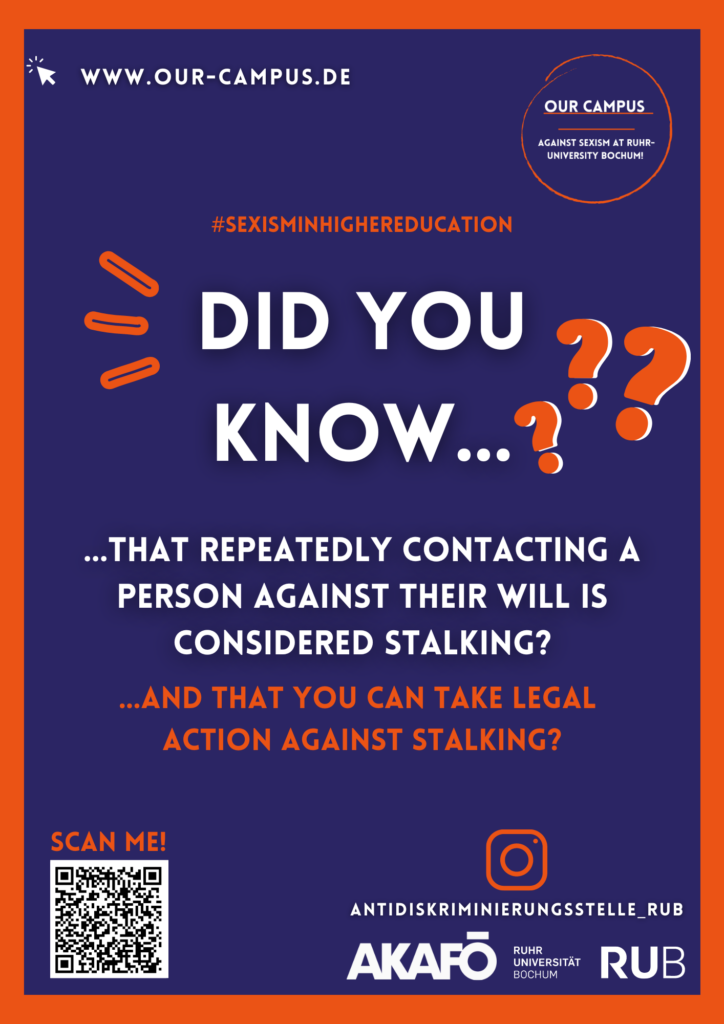
Power imbalances and power structures in universities, the anonymity on campus and at the same time the situation that you often find yourself sitting in lectures and seminars with the same people every week during the semester provide a potential source of stalking.
But what exactly do we mean by stalking?
Stalking is defined as follows in the anti-discrimination guidelines of Ruhr-Universität Bochum:
‘Stalking refers to the intentional and repeated following, stalking or harassment of a person in such a way that their lifestyle is seriously impaired or even their safety is threatened. Stalking can take many different forms. (…) Stalking can be carried out in different ways, e.g. through
- Phone calls, text messages, contact via messenger services and/or social media, messages on answering machines, emails – at all times of the day and night,
- ‘Messages of love’ such as love letters, flowers, gifts,
- orders for consignments of goods in the victim’s name,
- Presence as well as stalking and lying in wait, for example outside the victim’s home, place of study or workplace,
- False accusations, especially against higher-ranking third parties, for example employers,
- questioning the circle of acquaintances,
- Damage to property,
- insults and slander,
- Threats and coercion.’ [1]
In general, it does not depend on gender who becomes a stalker. However, the representative study mentioned above shows that 87% of the stalkers in the study were male and 13% female. The majority of the cases recorded were ex-partners of victims (39.6%) or people from their circle of social contacts (20.6%).
Stalkers want to gain attention and exert control by stalking and intruding into the most private spheres of those affected. Further reasons for stalking can be jealousy, a desire for power or revenge. [2]
Stalking can also have a direct impact on the health of those affected. A study on stalking published in 2018 by the Central Institute of Mental Health in Mannheim shows that those affected have experienced symptoms such as headaches, nausea, sleep disorders, inner restlessness, anxiety, panic attacks and depression. In addition, 41.7% of those surveyed stated that they had developed anger and aggression as well as general mistrust. [3]
Since 2007, stalking has also been a criminal offence under the legal term ‘stalking’ (§238 StGB). [4]
UNSER CAMPUS would like to raise awareness of stalking and make contact points for those affected more visible. If you are affected by stalking, you can find help at the following contact and counselling centres:
- The anti-discrimination centre
What advice is available?
The RUB Anti-Discrimination Office is the central advice, mediation and information centre for students, staff and other members of the university who experience or observe discrimination and have questions or need support on the subject.
In which languages do you offer counselling?
German and English
Making an appointment
From 2024 there will be regular consultation hours. These take place every Wednesday from 10:00 to 12:00.
Please register in advance at: antidiskriminierung@rub.de
- The central equal opportunities office
What advice is available?
The Equal Opportunities Office and the Central Equal Opportunities Officer are the points of contact at RUB for all issues relating to equality and equal opportunities. The Equal Opportunities Office is also the place to go for advice if you have experienced discrimination on the basis of sexual identity and gender.
In which languages do you offer counselling?
German & English
Making an appointment
Individual appointments can be made by email. Further information here. Consultation via Zoom is also possible!
In general:
- The White Ring and the No-Stalk-App
- The Weiße Ring offers counselling and help for victims of crime, sexualised and domestic violence and stalking. Multilingual counselling is also available on request.
The Weiße Ring can be contacted anonymously, nationwide and free of charge every day from 7 a.m. to 10 p.m. on 116006.
The Bochum branch can be contacted by telephone on 0234 413398 and by email at bochum@mail.weisser-ring.de.
The NO STALK app from the Weißer Ring is used to document stalking incidents. The data provides the police with direct evidence. The permanent availability of the app also encourages people to record every incident. The app is available in German in the Apple and Google Playstore.
You can find a video explaining the apphere and further information on the topic of self-help here.
If you have any questions, you can contact us at nostalk@weisser-ring.de
- The helpline
You can call the women’s helpline round the clock on 08000 116 016 . All information is treated confidentially.
There is also a chat function and counselling is available in 17 different languages (including sign language, English, Turkish, Russian, French and Spanish).
- ‘STOP-STALKING’ counselling centre (also offers counselling for stalkers)
The ‘STOP-STALKING’ counselling centre offers information for those affected by stalking and for stalkers. The advice centre works with an anonymised online chat tool.
Sources:
[1] Anti-discrimination guidelines of Ruhr-Universität Bochum, 2023.
[2] What to do about stalking? Violence against women helpline (accessed on 21/10/2024)
[3] Dreßing, Prof. Dr Harald and others: Stalking Study 2018, Central Institute for Mental Health Mannheim (retrieved on 22/10/2024
[4] An unfair behaviour – Stalking at the university – BSZ (retrieved on 21.10.2024) / Stalking – Humboldt-Universität zu Berlin (retrieved on 21.10.2024)

